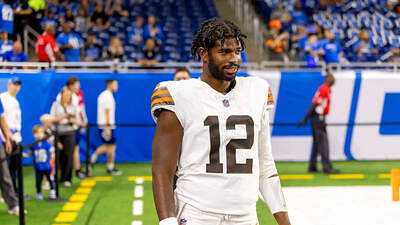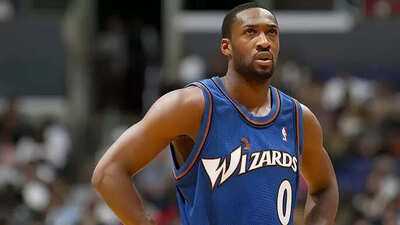"Lives in the Shadow of His Father!": NBA All-Star Gilbert Arenas Drops Bombshell Comparison Between Shedeur Sanders and Bronny James' Battle with Legacy
Gilbert Arenas has landed in an intense debate in the sports world after drawing a bold comparison between two of today’s most talked-about young athletes - Shedeur Sanders and Bronny James . Speaking on The Arena podcast, the former NBA star dissected the pressures these second-generation talents face as they strive to build their own identities while carrying the immense weight of their fathers’ legacies - Deion Sanders and LeBron James, respectively. His remarks have since ignited heated discussions among fans and analysts alike about privilege, expectation, and the meaning of legacy in modern sports.
The Controversy Behind Gilbert Arenas’ Comparison
The controversy stemmed from Gilbert Arenas’ analysis of a viral moment involving Shedeur Sanders, now a rookie quarterback for the Cleveland Browns. After finding out he would remain behind Dillon Gabriel and Joe Flacco on the team’s depth chart, Shedeur Sanders chose to remain silent during a post-practice media session. Many viewed this as a display of frustration, but Arenas saw something deeper - an echo of the immense pressure that comes with being the son of a sports icon.
Arenas likened Shedeur’s situation to that of Bronny James, who continues to navigate the relentless scrutiny that comes with being LeBron’s son. “Just like Bronny currently lives in the shadow of his father LeBron, Shedeur has big shoes to fill as his dad was the legendary Deion Sanders,” Gilbert Arenas said. He explained that both athletes are forced to balance their ambitions with the public’s towering expectations - expectations that can motivate greatness but also become suffocating before they’ve even had a fair chance to prove themselves.
Revisiting the “Nepo Baby” Conversation

Arenas’ comments tapped into the broader “nepo baby” debate that has dominated sports and entertainment discussions in recent years. The term refers to the sons and daughters of famous figures who receive opportunities perceived as products of their family connections rather than pure merit. According to Arenas, athletes like Bronny and Shedeur are caught in a double bind - they enjoy access and attention that open doors but must also endure scrutiny that ordinary rookies never face.
Shedeur’s refusal to speak with reporters was quickly turned into a national talking point, much like the criticism that often follows Bronny. Gilbert Arenas noted that Shedeur Sanders’ silence wasn’t arrogance but it was a moment of restraint under extreme pressure. He argued that being Deion Sanders’ son automatically places “Tom Brady-level responsibility” on Shedeur’s shoulders before he’s even played a full NFL season. Arenas called for empathy, urging fans and media to recognize the mental toll that comes with these inherited expectations.
Bronny James and the Constant Spotlight
For Bronny James, the glare of the spotlight has been especially unforgiving. Drafted 55th overall by the Los Angeles Lakers, the young guard continues to draw polarized opinions. While some believe his selection was driven by marketing and legacy, others see genuine potential in his play. Bronny has already shown flashes of promise - most notably during his 17-point performance against the Milwaukee Bucks - but public reaction remains divided.
Gilbert Arenas has consistently defended Bronny James, pushing back against the criticism and highlighting the double standards he faces. He praised the 20-year-old’s maturity and ability to handle adversity, pointing to several moments in the G League and NBA where Bronny’s poise outshone his statistics. For Arenas, Bronny’s development should be viewed through the lens of patience rather than immediate expectation, emphasizing that even great players need time to grow.
Shedeur Sanders: Under the NFL Microscope

Shedeur Sanders’ journey has been similarly magnified since entering the NFL. From his standout college career under his father, Coach Prime, to his transition into professional football, every move he makes is dissected by fans and commentators. Gilbert Arenas believes that this level of attention can distort perception - turning ordinary rookie learning moments into headline controversies.
As a third-string quarterback, Shedeur faces the dual challenge of proving his worth while living up to Deion’s unmatched legacy. Arenas pointed out that whether Shedeur Sanders speaks or stays silent, his actions are interpreted as symbolic statements about privilege, pressure, or entitlement. For a young player still adjusting to the league, this kind of scrutiny can be overwhelming.
Why Gilbert Arenas’ Perspective Makes Sense
Gilbert Arenas’ comparison between Shedeur and Bronny extends beyond sensational commentary - it reflects a broader question about fairness and individuality in sports. Both young men are navigating the fine line between opportunity and expectation, with their last names serving as both a blessing and a burden. Arenas’ perspective forces fans to confront uncomfortable truths: that legacy can open doors but also create cages of expectation, and that public judgment often ignores the human side of ambition.
Arenas’ Unfiltered Analysis
Part of what makes Gilbert Arenas’ commentary so compelling is his fearless delivery. Whether he’s making tongue-in-cheek analogies like “Tom Brady responsibilities” or diving into the deeper psychology of sports pressure, Arenas speaks with a mix of entertainment and authenticity that keeps audiences engaged. He’s not afraid to challenge popular narratives, defend controversial athletes, or stir debate among fans and analysts.
His analysis of Bronny James and Shedeur Sanders may be controversial, but it underscores a larger conversation about how fame, legacy, and pressure intersect in today’s sports culture. Both athletes symbolize the complex reality of growing up in the shadow of greatness - where every success is seen as expected, and every misstep becomes a headline.
Also read: Caitlin Clark Calls Lexie Hull ‘Reckless’ for Making Her Suffer; Claims How the Indiana Fever Wouldn’t Have Survived Without It
In the end, Gilbert Arenas’ remarks are less about controversy and more about perspective. They remind fans that behind the names Bronny James and Shedeur Sanders are young athletes trying to define who they are in a world that already thinks it knows.
The Controversy Behind Gilbert Arenas’ Comparison
The controversy stemmed from Gilbert Arenas’ analysis of a viral moment involving Shedeur Sanders, now a rookie quarterback for the Cleveland Browns. After finding out he would remain behind Dillon Gabriel and Joe Flacco on the team’s depth chart, Shedeur Sanders chose to remain silent during a post-practice media session. Many viewed this as a display of frustration, but Arenas saw something deeper - an echo of the immense pressure that comes with being the son of a sports icon.
Arenas likened Shedeur’s situation to that of Bronny James, who continues to navigate the relentless scrutiny that comes with being LeBron’s son. “Just like Bronny currently lives in the shadow of his father LeBron, Shedeur has big shoes to fill as his dad was the legendary Deion Sanders,” Gilbert Arenas said. He explained that both athletes are forced to balance their ambitions with the public’s towering expectations - expectations that can motivate greatness but also become suffocating before they’ve even had a fair chance to prove themselves.
Revisiting the “Nepo Baby” Conversation
Arenas’ comments tapped into the broader “nepo baby” debate that has dominated sports and entertainment discussions in recent years. The term refers to the sons and daughters of famous figures who receive opportunities perceived as products of their family connections rather than pure merit. According to Arenas, athletes like Bronny and Shedeur are caught in a double bind - they enjoy access and attention that open doors but must also endure scrutiny that ordinary rookies never face.
Shedeur’s refusal to speak with reporters was quickly turned into a national talking point, much like the criticism that often follows Bronny. Gilbert Arenas noted that Shedeur Sanders’ silence wasn’t arrogance but it was a moment of restraint under extreme pressure. He argued that being Deion Sanders’ son automatically places “Tom Brady-level responsibility” on Shedeur’s shoulders before he’s even played a full NFL season. Arenas called for empathy, urging fans and media to recognize the mental toll that comes with these inherited expectations.
Bronny James and the Constant Spotlight
For Bronny James, the glare of the spotlight has been especially unforgiving. Drafted 55th overall by the Los Angeles Lakers, the young guard continues to draw polarized opinions. While some believe his selection was driven by marketing and legacy, others see genuine potential in his play. Bronny has already shown flashes of promise - most notably during his 17-point performance against the Milwaukee Bucks - but public reaction remains divided.
Gilbert Arenas has consistently defended Bronny James, pushing back against the criticism and highlighting the double standards he faces. He praised the 20-year-old’s maturity and ability to handle adversity, pointing to several moments in the G League and NBA where Bronny’s poise outshone his statistics. For Arenas, Bronny’s development should be viewed through the lens of patience rather than immediate expectation, emphasizing that even great players need time to grow.
Shedeur Sanders: Under the NFL Microscope
Shedeur Sanders’ journey has been similarly magnified since entering the NFL. From his standout college career under his father, Coach Prime, to his transition into professional football, every move he makes is dissected by fans and commentators. Gilbert Arenas believes that this level of attention can distort perception - turning ordinary rookie learning moments into headline controversies.
As a third-string quarterback, Shedeur faces the dual challenge of proving his worth while living up to Deion’s unmatched legacy. Arenas pointed out that whether Shedeur Sanders speaks or stays silent, his actions are interpreted as symbolic statements about privilege, pressure, or entitlement. For a young player still adjusting to the league, this kind of scrutiny can be overwhelming.
Why Gilbert Arenas’ Perspective Makes Sense
Gilbert Arenas’ comparison between Shedeur and Bronny extends beyond sensational commentary - it reflects a broader question about fairness and individuality in sports. Both young men are navigating the fine line between opportunity and expectation, with their last names serving as both a blessing and a burden. Arenas’ perspective forces fans to confront uncomfortable truths: that legacy can open doors but also create cages of expectation, and that public judgment often ignores the human side of ambition.
Arenas’ Unfiltered Analysis
Part of what makes Gilbert Arenas’ commentary so compelling is his fearless delivery. Whether he’s making tongue-in-cheek analogies like “Tom Brady responsibilities” or diving into the deeper psychology of sports pressure, Arenas speaks with a mix of entertainment and authenticity that keeps audiences engaged. He’s not afraid to challenge popular narratives, defend controversial athletes, or stir debate among fans and analysts.
His analysis of Bronny James and Shedeur Sanders may be controversial, but it underscores a larger conversation about how fame, legacy, and pressure intersect in today’s sports culture. Both athletes symbolize the complex reality of growing up in the shadow of greatness - where every success is seen as expected, and every misstep becomes a headline.
Also read: Caitlin Clark Calls Lexie Hull ‘Reckless’ for Making Her Suffer; Claims How the Indiana Fever Wouldn’t Have Survived Without It
In the end, Gilbert Arenas’ remarks are less about controversy and more about perspective. They remind fans that behind the names Bronny James and Shedeur Sanders are young athletes trying to define who they are in a world that already thinks it knows.
Next Story